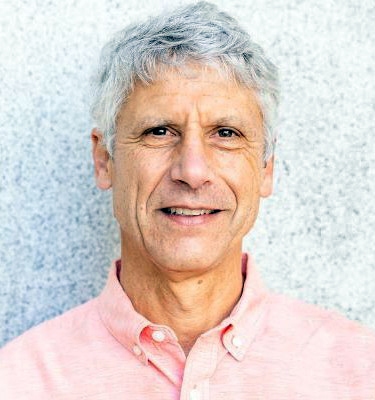Online PhD in Theology programs offer opportunities for rich, rigorous, and specialized academic study and inquiry. They provide doctoral candidates access to scholarly training and exchanges.
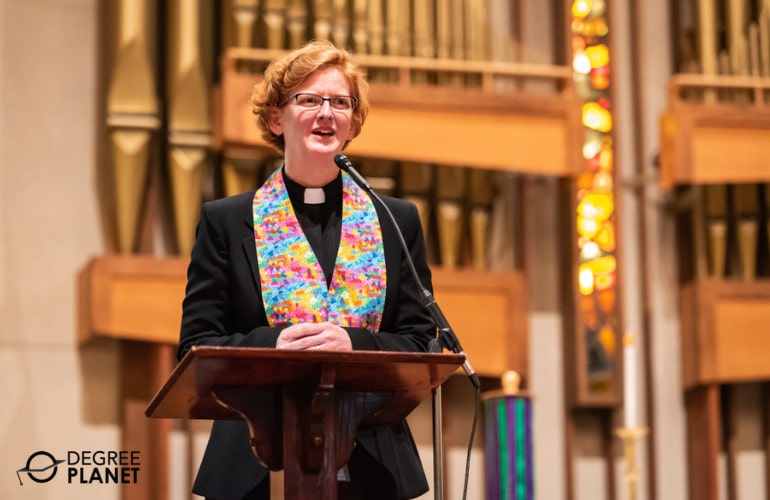
Earning a PhD in Biblical Studies, Divinity, or Theology can be a strategic way to advance into more senior roles in church leadership or ministry.
Editorial Listing ShortCode:
Professionals who earn a PhD in Theology can also hone their skills in academic research and writing, and many go on to become writers or postsecondary teachers.
PhD in Theology Online Programs

Online doctoral programs in theology and religion offer a range of curriculum designs, much like you would experience in an online masters in theology program. Based on your learning interests and career goals, you may want to look at PhD tracks in theology. These programs typically offer advanced courses on a wide range of academic topics, including:
- Ancient and modern history and culture
- Biblical languages
- Comparative studies in religion
- Scholarly approaches to biblical interpretation and exegesis
Some people want a program that is more focused on practical leadership skills needed for senior pastor roles. If this is you, you may want to compare curriculum designs offered in online religious studies programs, doctor in theology programs, and doctorate in ministry programs.
Editorial Listing ShortCode:
Theological doctorates also offer degree specializations that can help you tailor your studies to your specific area of interest. Different schools can offer different specializations, so it’s beneficial to find a program that emphasizes your intended specialty.
Theology and Divinity Careers & Salaries
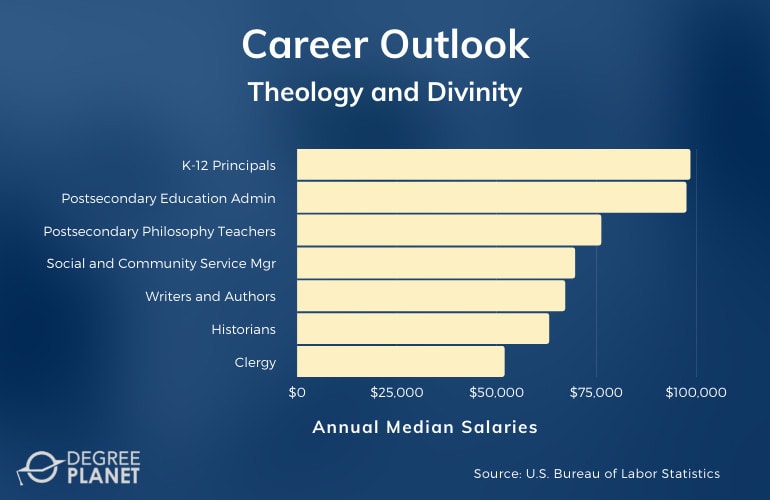
Many professionals who go to divinity school do so to pursue a career in church leadership within a specific denomination.
Some professionals who study theology or divinity pursue pastoral care or counseling careers. Others who have a strong passion for service or social justice may work as social workers or work in the nonprofit sector. Those with more scholarly interests might pursue careers as authors, historians, theologians, educators, or publishers.
According to the Bureau of Labor Statistics, there are many rewarding career pathways for those with aptitudes in education, ministry, or community service.
| Careers | Annual Median Salaries |
| K-12 Principals | $98,490 |
| Postsecondary Education Administrators | $97,500 |
| Postsecondary Philosophy and Religion Teachers | $76,160 |
| Social and Community Service Managers | $69,600 |
| Writers and Authors | $67,120 |
| Historians | $63,100 |
| Clergy | $51,940 |
| Marriage and Family Therapists | $51,340 |
| Substance Abuse, Behavioral Disorder, and Mental Health Counselors | $47,660 |
| Religious Activities and Education Directors | $45,110 |
Many professionals with theology training seek to apply their knowledge directing religious programming, leading congregations, or teaching theology in postsecondary institutions. Divinity school graduates and professionals who get a PhD in Theology sometimes conduct scholarly research and work at universities, seminaries, or divinity schools.
Many others, though, use their academic, spiritual, and ethical training in secular roles, as educators, managers, counselors, or therapists.
Theology Doctorate Curriculum & Courses

Course options and curriculum designs vary by school and program, but graduate programs in theological studies often require intensive study of religious doctrines, texts, and languages. Some programs also offer more practical courses on church administration and homiletics.
Here are some theology courses you may come across in your studies:
- Judeo-Christian Doctrine and World Religions: This course reviews foundational principles of comparative religion and theology. It focuses on the unique features of Jewish culture and history as well as the genesis and core tenets of Judeo-Christian beliefs.
- Introduction to Systematic Theology: This course examines how scholars seek to codify and articulate Christian theological doctrine, studying relevant scriptural sources and underlying exegetical frameworks.
- Old Testament Scholarship: You’ll learn about historical, cultural, linguistic, and doctrinal features of the Old Testament and explore references to comparative features of other ancient religions and New Testament theology.
- New Testament Theology: This class examines core features of scriptural form, tradition, and language in the New Testament, and it explores key tenets and controversies related to New Testament exegesis, interpretation, and scholarship.
- Advanced Studies in New Testament Greek: You can develop increased mastery of Ancient Greek. This course may also include insights into the historical development of Greek and advanced concepts in linguistic form and structure, especially as they may relate to scriptural exegesis.
- Congregational Leadership: This course explores practical methods for effective congregational administration and leadership, with an emphasis on homiletics, developing effective ministries, and supporting youth and adult Christian formation.
- Comparative Theology: You’ll learn about methods and approaches used in the discipline of comparative theology, and you’ll learn about universal themes and concepts characterizing enduring religious traditions.
- Survey of Christian Culture and History: This course takes a look at Christian scriptures and beliefs through the lens of secular studies and topics related to Judeo-Christian, Roman, and Greek history and culture.
- The Prophetic Tradition: With an emphasis on Old Testament and New Testament prophets, this course examines the nature of prophecy and the role of prophetic figures.
- Christianity and Modern Culture: With a focus on modern centuries, this class examines where Christian and secular worldviews converge and diverge as well as where they mutually influence, reflect, and inform one another.
- Research Methods in Theology: This course provides explicit instruction in advanced research tools, sources, and methods for theological research and for guiding doctoral dissertation work.
Doctoral theology programs can help you deepen your biblical knowledge, scrutinize tenets of Christian doctrine, and explore both religiously and secularly informed approaches to Christian faith and scholarship.
Online Doctorate in Theology Admissions Requirements

Admissions requirements will vary by school and program. In many cases, though, prospective students are expected to have some prior background in religious studies and relevant ancient languages.
- GRE or GMAT scores (only some schools require them)
- Master’s degree in religion, theology, or relevant major
- Satisfactory college GPA
- Statement of faith or purpose
- Letters of recommendation
It’s not uncommon for admissions committees to be curious about your professional goals and to want to know if your research interests align with faculty specializations at their school.
Online Theology Doctorate Programs Accreditation
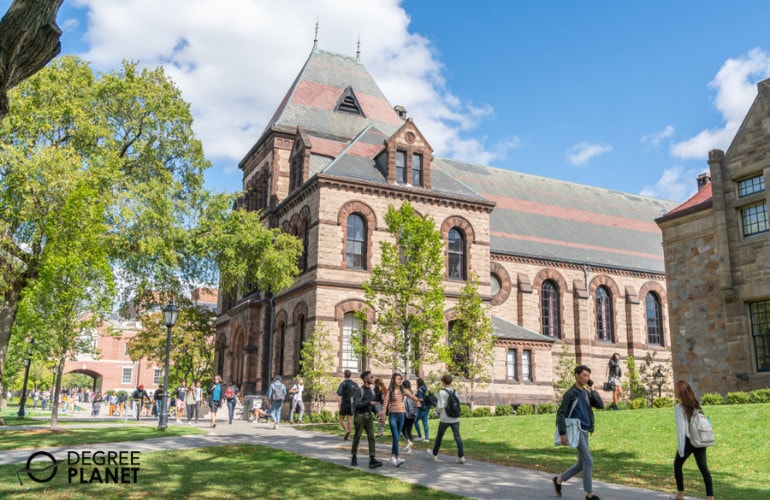
Accreditation helps ensure your degree is honored by other schools, licensing boards, and future employers. Regional accreditation typically offers the best assurances.
By studying at a regionally accredited school, you can be more confident that you’ll receive a rigorous curriculum, highly qualified faculty, and more abundant academic resources and services. Accreditation can also be a precondition for some forms of financial aid.
Editorial Listing ShortCode:
Organizations such as the Council for Higher Education Accreditation (CHEA) have more information about accreditation and finding accredited schools.
Financial Aid and Scholarships

Doctoral degrees take considerable time and focus, and financial assistance opportunities can help qualifying students move forward.
Common forms of financial aid include state and federal grants, scholarships, employer-sponsored tuition support, and student loans. Terms and conditions can vary, so it’s strategic to review all offers carefully. If you anticipate seeking need-based assistance, submitting the Free Application for Federal Student Aid (FAFSA) could be a strategic first step.
What Can I Do with a Doctorate Degree in Theology?

Earning a PhD in Theology can help you gain a stronger understanding of Christian doctrine and develop advanced expertise in biblical study and interpretation.
You can apply your theological studies to pursue a range of careers. Divinity doctoral programs typically provide a pipeline to jobs in church leadership and congregational ministry, while a theologian who earns a PhD might pursue jobs in academia.
Some professionals use their spiritual studies and ethically oriented intellectual development as a springboard for leading schools or community nonprofits. According to the Bureau of Labor Statistics, postsecondary teachers make a median wage of $80,560 per year, clergy make a median of $51,940, and K-12 principals make a median of $98,490. The median salary for social and community service managers is $69,600.
Some professionals might also apply their scholarly study and training to roles in other careers, such as historians or authors.
How Long Does It Take to Get a Doctoral Degree in Theology Online?

For many scholars, getting a doctoral degree typically takes 3 to 5 years, sometimes more. Completing a dissertation can also extend the time it takes you to finish. It’s often difficult to predict how long it will take to complete a dissertation since it’s dependent on many factors.
If you study full-time, year-round and choose a program with more streamlined study requirements and no dissertation, you can increase your chances of finishing in less time.
What’s the Difference Between a ThD vs. PhD in Theology?
A Doctor of Theology (ThD) and a Doctor of Philosophy (PhD) in Theology are both terminal degrees.
- Doctor of Theology: A ThD is a professional doctorate, so it is more oriented toward practical Christian leadership than a PhD in Theology.
- PhD in Theology: A PhD is Theology is typically more research based and academically oriented. It’s likely to have more emphasis on comparative religion and secularly informed scholarship.
A ThD is often a better fit for religious scholars who want a stronger focus on Christian doctrine and leadership. A PhD in Theology might be best for pursuing work in research and academia.
What’s the Difference Between a Doctor of Theology vs. Doctor of Ministry?

A Doctor of Theology (ThD) and Doctor of Ministry (DMin) both include the study of scripture and Christian doctrine.
- Doctor of Theology: A ThD is more scholarly and research-focused than a DMin, but it still emphasizes Christian leadership.
- Doctor of Ministry: A DMin focuses on practical Christian ministry, outreach, and leadership skills. It typically has more emphasis on practical skills for church administration and congregational leadership.
If you want a program that blends some practical leadership training with advanced academic study, inquiry, and research, you may want to look into online ThD programs to see what they offer.
What’s the Difference Between a Doctor of Divinity vs. PhD in Theology?

A Doctor of Divinity (DDiv) cannot typically be earned through a college program in the United States, but you can go to school to earn a PhD in Theology.
- Doctor of Divinity: In the US, a DDiv is awarded as an honorary degree. It’s sometimes awarded based on the honorees time working in ministry and their related contributions or accomplishments.
- PhD in Theology: A PhD in Theology is a degree that typically equips people for ongoing research and roles in academia. It’s likely to include study of systematic theology with more emphasis on comparative religions, linguistics, and ancient history.
If you’re looking to engage in the highest levels of scholarly inquiry and research, you might consider earning a PhD in Theology.
Is a Doctoral Degree in Theology Worth It?

Yes, a doctoral degree in theology is worth it for many professionals. If you want to enter into teaching, research, and publishing in the field of religion or theology, then a doctoral program, such as an on-campus or online PhD in Religion or Theology, can give you the opportunity to engage in rigorous academic inquiry with fellow scholars.
The Bureau of Labor Statistics projects 11% job growth for postsecondary philosophy and religion teachers over the next ten years. Positive job outlooks are expected for postsecondary education administrators and K-12 principals as well.
Editorial Listing ShortCode:
If you already have church leadership and ministry experience, getting a doctorate in theology could help you qualify for leadership roles that offer new challenges related to Christian scholarship or church leadership.
Universities Offering Online Doctorate in Theology Degree Programs
Methodology: The following school list is in alphabetical order. To be included, a college or university must be regionally accredited and offer degree programs online or in a hybrid format.

Bob Jones University offers a Ph.D. in Theological Studies. Students must complete 60 credit hours to graduate. A nonresident option is available for online students. The program consists primarily of independent research and online courses but does require a week-long module on campus. Applicants must have a master’s degree in a related field and need to complete competency exams to be eligible.
Bob Jones University is accredited by the Southern Association of Colleges and Schools Commission on Colleges.

Calvary University offers a Doctor of Philosophy in Bible and Theology. The program can typically be completed in 4 years, with the final year dedicated to a dissertation. Applicants must have a master’s degree in a related field with a GPA of 3.0 and submit two references, official transcripts, and a writing sample.
Calvary University is accredited by the Higher Learning Commission.

Clark Summit University offers a Doctor of Philosophy in Theology. To graduate, students must complete 60 credit hours and a concentration in Old Testament, New Testament, Systematic Theology, or Bible Exposition. Those interested in the program must have a master’s degree in a related field. Applicants may speak with admissions counselors for assistance if needed.
Clarks Summit University is accredited by The Commissions on Higher Education of the Middle States Association of Colleges and Schools.

Columbia International University offers a Doctorate in Practical Theology. The program is offered online and requires the completion of 45 credit hours. Full-time students can typically finish the program in 3 years. To be eligible for the program, applicants must have already obtained a master’s degree in a related field. To apply, applicants must submit an academic writing sample and a research proposal along with their application.
CIU is accredited by the Southern Association of Colleges and Schools Commission on Colleges.

Evangelical Seminary offers a Doctor of Theology. Students may choose one of the 11 different track options available, including the Biblical track. A total of 36 credits are needed to graduate. Applicants must have a master’s degree with a GPA of 3.0 or higher and submit a reference letter, a statement of intent, a writing sample, and a resume.
Evangelical Seminary is accredited by the Higher Learning Commission.
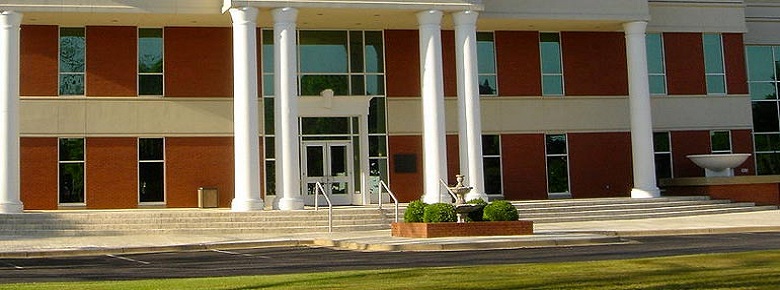
Faulkner University offers a Doctor of Philosophy in Biblical Studies. The program requires the completion of 55 semester hours and can typically be completed in 4 years. Applicants must have a master’s degree in a related field with a GPA of 3.0 or higher. Official transcripts, 3 letters of recommendation, and a statement of intent must be submitted when applying.
Faulkner University is accredited by the Southern Association of Colleges and Schools Commission on Colleges.

Gateway Seminary offers a Ph.D. in Biblical Studies and Ph.D. in Theology. To graduate, students must complete 42 credit hours, including a dissertation. The program must be finished within 6 years unless special permission is granted. Applicants must have a master’s degree in a related field and meet the program’s Hebrew and Greek requirements.
Gateway Seminary is accredited by the Western Association of School and Colleges.

Johnson University offers a Ph.D. in Leadership Studies with the option to complete a track in Theology of Leadership. Students must complete 60 credit hours to graduate. Those interested in the program must submit an online application and official transcripts from all schools attended.
Johnson University is accredited by the Southern Association of Colleges and Schools Commission on Colleges.
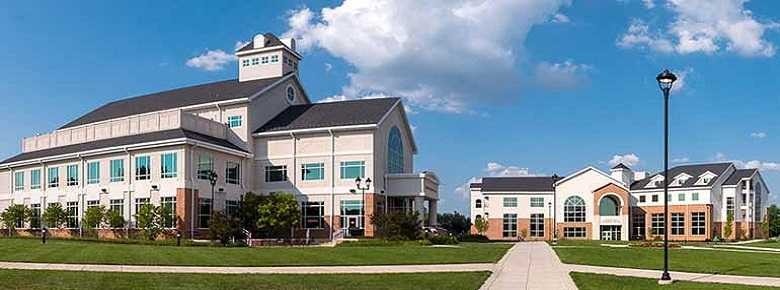
Lancaster Bible College offers a Ph.D. in Biblical Studies. Students must complete 60 credit hours, a dissertation, and a residency to graduate. Applicants must have a master’s degree in a related field, official transcripts from all schools attended, professional references, and either MAT or GRE test scores.
Lancaster Bible College is accredited by the Middle States Commission on Higher Education.

Liberty University offers a Ph.D. in Theology and Apologetics. Students must complete 42 credit hours and a 15 hour dissertation to graduate. Applicants must submit a letter of intent, 3 references, a writing sample, transcripts from their bachelor’s and master’s programs, and either MAT or GRE test scores.
Liberty University is accredited by the Southern Association of Colleges and Schools Commission on Colleges.

Oral Roberts University offers a Ph.D. in Contextual Theology. Students must complete 51 credit hours with a GPA of 3.25 to graduate. Those interested in the program must have a GPA of 3.25 and submit GRE test scores, a vocational essay, a writing sample, and a research proposal.
Oral Roberts University is accredited by the Higher Learning Commission.
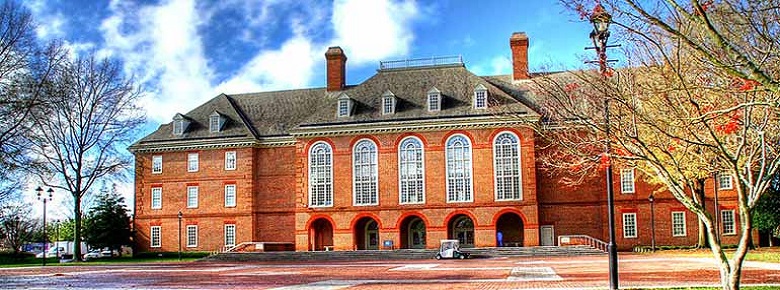
Regent University offers a Ph.D. in Renewal Theology. The program can be completed online but does require a residency. Students must complete 60 credit hours to graduate. A total of 4 concentrations are available for students. Applicants must submit a clergy recommendation, an academic writing sample, and college transcripts.
Regent University is accredited by the Southern Association of Colleges and Schools Commission on Colleges.

Southwestern Baptist Theological Seminary offers a Doctor of Philosophy in Theology. Students may focus their studies in Biblical Studies, Theological Studies, Ethics and Philosophical Studies, or Pastoral Studies. Applicants must submit official transcripts, GRE test scores, a writing sample, and 2 references and complete an entrance interview.
Southwestern Baptist Theological Seminary is accredited by the Southern Association of Colleges and Schools Commission on Colleges.

St. Thomas University offers a Doctor of Philosophy in Theology and Ethical Leadership. Students must have 54 credit hours to graduate, including a capstone seminar and a doctoral dissertation. Applicants must have a master’s degree in a relevant field with a minimum GPA of 3.0 and complete an interview with the dean of the school.
St. Thomas University is accredited by the Southern Association of Colleges and Schools Commission on Colleges.

Vanderbilt University offers a Doctor of Philosophy in Religion with a concentration in Theological Studies. Students must complete 72 credit hours, including 2 modern languages and either another modern language or a biblical language. Those interested in the program may apply online through the school’s website.
Vanderbilt University is accredited by the Southern Association of Colleges and Schools Commission on Colleges.
Getting Your Ph.D. in Theology Online

Getting a PhD can enable you to expand your scholarly horizons and become immersed in in-depth inquiry, study, and scholarly research.
PhD programs can also offer a way to prepare for teaching positions at colleges, universities, and seminaries. Doctoral theology programs at accredited schools offer a wide range of program structures and curriculum designs, and accredited online theology degree programs tend to offer flexible schedules and added convenience.
You can start exploring Doctor of Theology programs online today to find the program that best fits your personal and professional goals.

